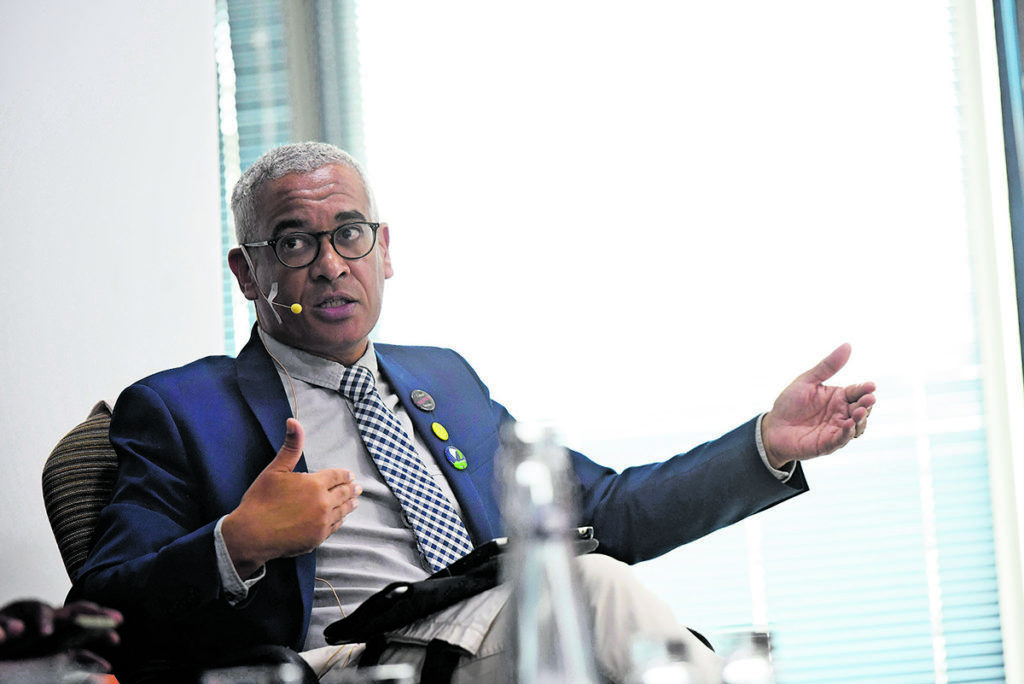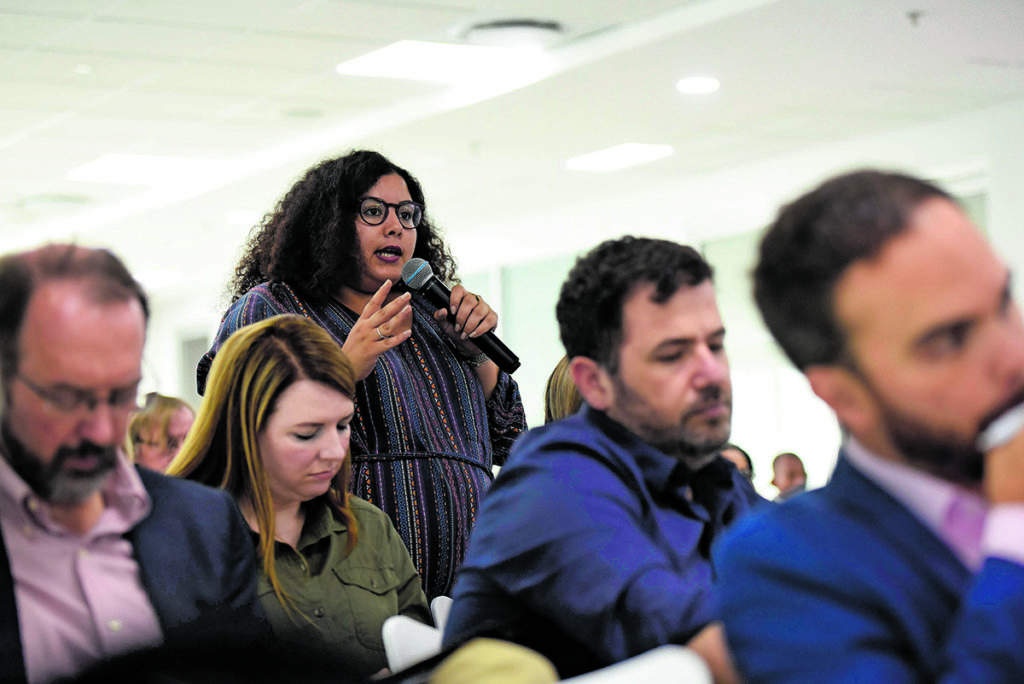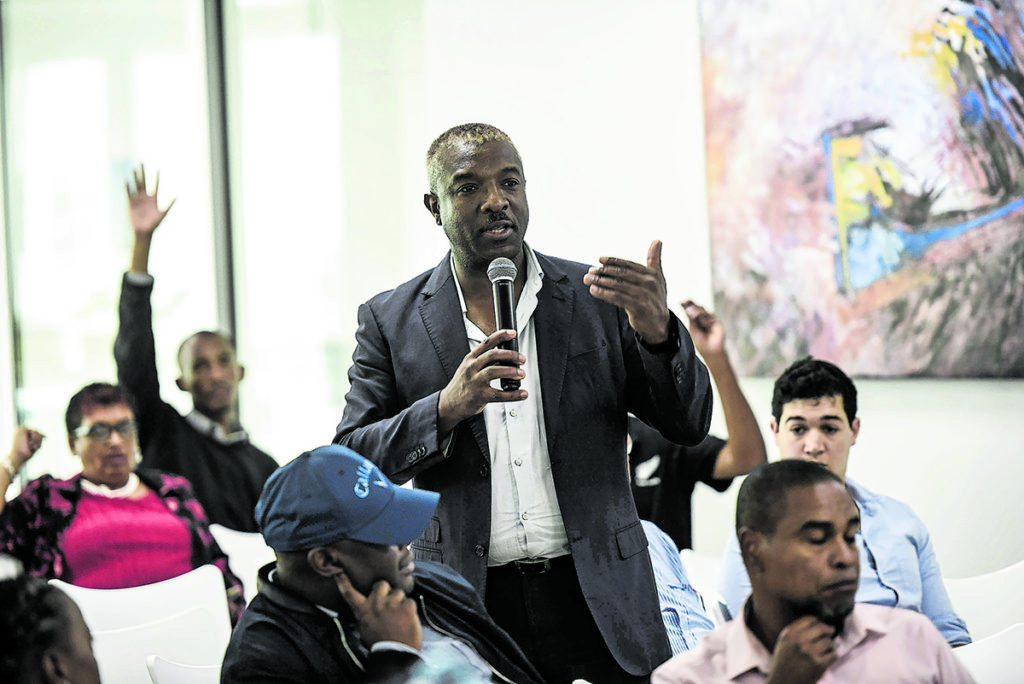SPONSORED
Two weeks after the state of the nation address (Sona), the substance of President Cyril Ramaphosa’s speech appears to have been long forgotten. Instead, what has endured is a continuing debate over the place of FW De Klerk in South African society, and the struggle of South Africans grappling with the reminders of a brutal past.
It was the Economic Freedom Fighters who disrupted proceedings on the night, and, after a delay, the members of third-largest party in South Africa’s democracy walked out.
But there was no “substance” to the EFF’s disruptions or their strategy for the night, political analyst Angelo Fick said at a post-Sona Critical Thinking Forum, hosted by the Mail & Guardian in partnership with Rosa Luxemburg Stiftung at the offices of Webber Wentzel in Cape Town.
 Angelo Fick says the president’s Sona speech is full of contradictions and doesn’t adequately take into account the looming climate crisis. (David Harrison)
Angelo Fick says the president’s Sona speech is full of contradictions and doesn’t adequately take into account the looming climate crisis. (David Harrison)
The EFF’s plan was “poorly planned and badly executed”, Fick said. He likened the fighters’ tactics to an “expensive sitcom” that plays out annually. “It is the idea of disruption mistaken for actual disruption. It is the idea of rhetorical flourish, mistaken for actual political engagement,” he said.
Fick was joined by Khaya Sithole, Rebecca Sibanda and Lester Kiewitt, while a generous audience weighed in with their thoughts and ideas about the president’s address.
Sibanda cautioned against a growing demand for Ramaphosa to accept more responsibility for the state’s many failures. “So we have to be mindful of the fact that [when] we speak of the president you’re speaking of the ANC that has deployed [him] onto that stage, right? So I don’t subscribe to the view that we can lay all the blame at his feet. It’s the entire institution that needs to be addressed,” she said.
Bongekile Macupe, reporting for the M&G, noted that that the analysts at the forum did not have many positive things to say about Ramaphosa’s fourth Sona.
 An audience member debates during the Critical Thinking Forum discussion on SONA 2020, Cape Town. (David Harrison)
An audience member debates during the Critical Thinking Forum discussion on SONA 2020, Cape Town. (David Harrison)
“There are times when we have fallen short, there are times when we have made mistakes, but we remain unwavering in our determination to build a society that is free and equal, and at peace,” Ramaphosa said.
For much of his speech, the president spoke of actions that were being undertaken to address the harsh realities confronting the country. He spoke about the “social compact” that was required to achieve the aim of this year’s Sona — inclusive growth. “We can succumb to the many and difficult and protracted problems that confront us, or we can confront them, with resolve and determination, and with action.”
But Sithole criticised the speech. He said it was not immediately clear what the theme of Ramaphosa’s speech was, but that on deeper inspection it appeared the thrust was about fixing so much of what was wrong with the state. To still be talking about fixing things “is problematic”, he said.
Sibanda criticised the president for not speaking about human rights, such as immigration and the refugee crisis in the country. “Those are real, serious issues, real people issues that are not going away,” she said.
Fick said Ramaphosa’s speech was contradictory in that the president talked about tackling the climate emergency, yet he spoke about creating jobs through the car industry.
 A member of the audience raises a point at the Critical Thinking Forum discussion on SONA 2020, Cape Town. (David Harrison)
A member of the audience raises a point at the Critical Thinking Forum discussion on SONA 2020, Cape Town. (David Harrison)
“There is a contradiction here. If you’re going to be building lots and lots of cars, you are not actually resolving the climate emergency — you’re contributing to it. So your solution for the unemployment problem and your solution or response to mitigate the climate crisis cannot have this kind of logical contradiction,” Fick said.
Sipho Kings, writing in the M&G, said Ramaphosa’s comments about climate change recognised the rising demand for action by young people, but he, too, felt the president had fallen short. “If every other country in the world acted like South Africa, the world will heat by nearly 4°C by the end of this century. South Africa, and the rest of the continent — which the president is now responsible for with his assumption of the African Union leadership — will start to become hard to live in if it heats up beyond 1.5°C,” Kings wrote.
He believes Ramaphosa’s comments did not show such green ambition, and notes that South Africa is the 12th-highest polluter in the world.